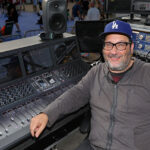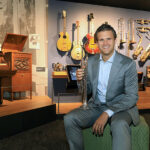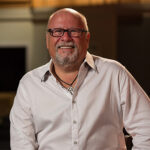It could be argued that FOH mixer Robert Collins has seen some of the greatest live rock ‘n’ roll shows ever. Actually, that would be a short debate, since Collins has stood in front of a laundry list of legends over the past number of decades, including this past summer’s run of 14 shows in the States with Eric Clapton and Steve Winwood.
Collins spent a few minutes between sound check and curtain on his tour bus to talk about the tour, gear from around the world and hiding his nicotine habit from his mother. The last bit there is off the record, just so you know.
FOH: This tour is such a short run. Does that put more pressure on you?

Robert Collins: Yes, in a way. A lot of big tours take a few shows to settle down, band included. We haven’t got that many, so we’ve got to hit it off the bat. But, no more pressure than normal. I take every show the same. Every one has got to be as good as you can get it, otherwise you just get frustrated any way. Of course, they don’t sound check. So, the lights go on, we make the sign of the cross and see what happens.
You’ve been out with Eric for so long. Do you know what to expect?
Well, it changes with different bands, so some songs are the same and some songs are not the same. That’s the beauty with Eric. It’s always different, which is great. If it was the same, it would be (point his thumb down). This band is drummer Abe Laboriel, Jr., bassist Willie Weeks, Chris Stainton on keyboards and background vocalists Michelle John and Sharon White. I feel that I mix a new show every night.
Too bad, because you could just program the show and go home.
I can’t program. (Laughs) I can’t even program my bloody laptop. Everybody laughs. I use a digital desk just like an analog desk. No cues, nothing. If it doesn’t come on it’s because I haven’t switched it on. I take full responsibility.
How did having Steve on board change the show?
Well, we’re doing both Steve’s songs and Eric’s songs. Steve’s singing and that’s a big change only from Eric’s standpoint. I’ve really enjoyed it. I love these two together.
So, what do you have to get your head around when you hear “14-show run?”
It’s totally different, but the thing is that we didn’t have time to think about this anyway. Starting off at the beginning of the year we went off to Japan, Australia and New Zealand with a different band. Then we came into London and changed some members of the band and we did 12 shows in the Albert Hall. The morning after our last show at the Albert we were on a plane to come straight to New York to set up for this band and do a week’s rehearsing.
Are you carrying or renting?
We carry our front of house and monitor desks. Everything else we’re renting.
What are you asking for?
A professional PA. (Laughs) Wheels to the back, chicken wire to the front. We’ve used anything from V-DOSC to VerTec to Meyer to d&b. In Australia we used VerTec, in New Zealand it was an EV system. We’ve been mostly using VerTec on this bit of shows.
How does that change your mix?
Well, it shouldn’t change my mix, but it certainly does. It’s just the way that different systems deliver. Some systems deliver really well and there’s plenty of space. It’s a bit like depth of field. On some PAs it’s very difficult to layer the instruments. Then there are other PAs, where you can set things back and still hear them clearly. There are a lot of systems where they just give it full on, so you’re forever playing to get them to sit right.
Do you have a preference?
Not really. Some are easier than others. Some of them have their own type of sound and then others have no sound at all, they just give you everything at volume and you try to create a sound with it. That’s a great thing, or a bad thing, depending on whether you can get it together or not. I don’t know how to answer that. I’ve always had favorites of things, but then you go to different continents or different countries and where your favorite was the best in the last continent that you were on, it’s totally different now.
Has there been a piece of gear that you’ve got on a show that you have to have with you wherever you go now?
That would never happen. I don’t think like that.
You’re an old-school analog cat. Was it hard to make the jump to digital?
It wasn’t hard to make the jump. It’s hard to know what to do with it. It’s hard to make it work. No, it wasn’t hard, because I just take it as sound. That’s the way that I look at it. I try not to complicate it. I try not to confuse it. I try to keep the same thing in my head as 30 years ago when I walked into a place and went, ‘My, God, it’s got to be better than this.’ I’m a fan of all things, anything that makes it better or more interesting. So, analog I love. And there is a lot of the little digital domain that I love. There’s lots of it that I don’t love, as well, but I tend not to dwell on it, otherwise it eats you up a little. You make your choice, you go with it.
What’s the trust level like between you and Eric? I imagine it’s off the charts.
I hope so. As we first said, ‘As soon as that day comes that you think I don’t know what’s going on, then I’m no good for you and you’re no good for me.’ We have our moments where we work together on things. It’s great working with Eric and I love working with Eric. Fortunately, I’ve been very very lucky, because everyone I’ve worked with I’ve tried to have a relationship with. It’s pointless otherwise.
Did having Steve along change your decisions on gear?
Steve never said anything, really. I came along with the microphones that I like to use, including the AT (4055) mics that I use for Eric’s vocals for his vocals.
Why those mics?
Because the spill sounds so much better in them and both Eric and Steve sing off the mic quite a bit. Especially blues things with Eric. He’s into playing guitar. Although he’s a great singer, sometimes he’s maybe two feet from the mic. He likes that. It’s art to him. So, we’ve always liked these mics. The spill quality is great and often Eric’s vocal mic is my overhead as well.
That must be fun to mix…
Oh, yeah, it’s stunning. Abe’s drum kit has big cymbals. I remember years ago when the singer wasn’t singing you used to mute the microphone and when he sang you’d open it up. You can’t do that with this, the whole sound changes. Everything is a blend.
Are you using anything special to monitor the mix?
No, I’m only listening through the PA. I’m only there for the audience. That’s the way I look at it. I’m in the middle of the hall to try and get it so the audience can hear everything that they want to hear, that they can pick things up that it’s not a big mess. That’s what I’m there for. I’m not there to do live tapes or anything else. I’m not interested. I’m a live engineer and I do it for the audience and the show and hopefully everybody walks out singing the songs.



